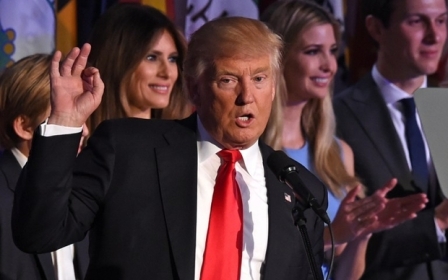World faces rising risk of conflict: US intelligence report
The incoming Donald Trump administration faces a world of greater risk of conflict, slower growth and more anti-democratic pressures than ever since the Cold War, a new US intelligence report released on Monday said.
'For better or worse, the emerging global landscape is drawing to a close an era of American dominance following the Cold War'
US leadership is ebbing amid shifts in economic, political and technological power, deep changes in the global landscape "that portend a dark and difficult near future," according to the National Intelligence Council's "Global Trends: Paradox of Progress" report.
"The next five years will see rising tensions within and between countries," said the report.
"For better or worse, the emerging global landscape is drawing to a close an era of American dominance following the Cold War."
The National Intelligence Council, a research group under the Office of the Director of National Intelligence, issues its global assessment every four years, and the new one came 11 days before Trump is inaugurated as president.
It painted a gloomy picture of the challenges pulling at the post-World War II global order, including extreme income disparities, technological dislocation, demographic shifts, the impacts of global warming, and intensifying communal conflicts.
Moreover, Western democracies will find it harder and harder to stick to their principles and avoid being pulled apart from each other, according to the study.
"It will be much harder to cooperate internationally and govern in ways publics expect," it said.
More countries will be able to "veto" cooperative efforts and the myriad channels of global communication will leave large numbers and groups of people misinformed and divided, the report said.
"Information 'echo chambers' will reinforce countless competing realities."
The report, whose authors comprise analysts from the intelligence and academic communities, also says that the liberalism that defined the West and allies after World War II is under threat from populism on both the right and left, as governing countries and societies gets harder.
"Publics will demand governments deliver security and prosperity, but flat revenues, distrust, polarisation and a growing list of emerging issues will hamper government performance."
Those trends underscore the need for Washington to shore up traditional Western alliances and friendships as Russia and China test their resolve to preserve their influence, it said.
Yet the report warned US leaders not to be tempted to try to resuscitate the kind of Pax Americana, the policy of US-imposed global peace, which steered the global order from the 1950s.
"It will be tempting to impose order on this apparent chaos, but that ultimately would be too costly in the short run and would fail in the long run," eroding US political strength.
Ongoing wars in the Middle East, including the war in Syria, have caused the biggest humanitarian and refugee crises since World War II.
Meanwhile, the rise of populism is empowering right wing political parties across Europe and has led to Britain’s exit from the EU and Trump’s election in the United States.
This article is available in French on Middle East Eye French edition.
Stay informed with MEE's newsletters
Sign up to get the latest alerts, insights and analysis, starting with Turkey Unpacked
Middle East Eye delivers independent and unrivalled coverage and analysis of the Middle East, North Africa and beyond. To learn more about republishing this content and the associated fees, please fill out this form. More about MEE can be found here.




